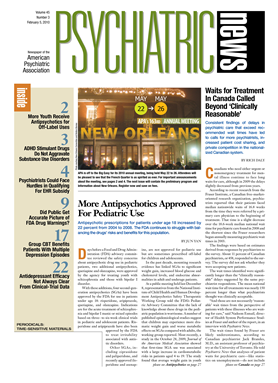Depression in people with type 2 diabetes appears to be associated with a clinically significant risk of microvascular and macrovascular complications.
A five-year longitudinal prospective study of more than 3,000 patients with type 2 diabetes found that patients with comorbid depression at baseline had a more than one-third higher risk of developing advanced microvascular complications such as end-stage renal disease or blindness compared with patients without depression. Also, they had a 25 percent higher risk of developing advanced macrovascular complications such as heart attack or stroke.
Moreover, the association remained true after controlling for prior complications and demographic, clinical, and diabetes self-care variables. Adjustment for differences in health habits and glycemic control reduced the association between depression and macrovascular complications, but did not change the association between depression and microvascular complications.
The study was reported in the February Diabetes Care.
“Depression is negatively related to diabetes from onset to death,” lead author Elizabeth Lin, M.D., M.P.H., told Psychiatric News. “For patients with depression and diabetes, the risk of complications such as amputation, vision loss, end-stage renal failure, myocardial infarctions, and strokes is significantly higher compared with patients with no depression. When taking care of patients with depression and diabetes, it is important to inquire about their self-care, such as healthy eating, taking diabetes medicines, being active, as well as making regular visits with their primary care physicians.”
Lin is a family medicine physician and scientific investigator at the Group Health Research Institute of the Group Health Cooperative in Seattle. She is also a clinical professor in the Department of Psychiatry and Behavioral Sciences at the University of Washington Medical School.
The cohort for the study was drawn between 2000 and 2002 from adults in the Group Health Cooperative diabetes registry who received care at any of nine primary care clinics in the Seattle/Puget Sound area.
A baseline questionnaire was returned by 4,623 patients with type 2 diabetes. The Patient Health Questionnaire-9 (PHQ-9) was used to ascertain probable major and minor depression.
Approximately five years after enrollment, surviving members of the original cohort of patients with type 2 diabetes were contacted again by a mailed letter and follow-up telephone call in the period 2005-2007. Consenting patients completed a 20-minute telephone interview and were asked for permission to review their electronic and paper medical records for information on medical conditions.
The final sample size was 3,723 patients. Researchers identified documented macrovascular and microvascular complications of diabetes, before baseline and during follow-up.
Microvascular complications included end-stage renal disease, low vision or blindness, proliferative retinopathy or photocoagulation procedures for diabetes, foot ulcers, and amputations. Macrovascular complications included heart attack, stroke, congestive heart failure, cardiovascular procedures, and cardiovascular and peripheral vascular disease leading to revascularization procedures.
Results showed that over a five-year period, patients with major depression and diabetes had a 36 percent higher risk of developing advanced microvascular complications and a 25 percent higher risk of macrovascular complications compared with diabetes patients without depression.
The strength of the association between depression and risk of adverse events generally increased with adjustment for demographic variables but decreased with adjustment for clinical characteristics, the authors stated.
Lin told Psychiatric News that depression can affect the vascular system via the hypothalamus-pituitary-adrenal axis through stimulation of cortisol secretion and via the sympathetic nervous system through increased catecholamine release. Depresssion may also play a role in stimulating pro-inflammatory and pro-coagulation responses.
However, the relationship between depression and poor vascular outcomes in type 2 diabetes is liable to be bidirectional.
“Healthy living plays an important role in optimal care for both diabetes and depression,” Lin told Psychiatric News. “Patients with depression are more likely to smoke, be sedentary and overweight, and be less likely to take medications. The lack of healthful behaviors can worsen both diabetes and depression.
“We consider that depression can worsen diabetes, and diabetes can worsen depression—a negative bidirectional relationship,” she said.
Lin also said the study results call for greater collaboration between psychiatrists and primary care. “Ideally, psychiatrists will communicate with the primary care physicians about depression treatment,” she said. “Conversely, the primary care physician will also send the psychiatrists a care plan for their diabetes/chronic medical problems that the psychiatrist can also reinforce with the patients.”
John Newcomer, M.D., of the Washington University School of Medicine in St. Louis, said the report examines a large cohort and extends existing literature on the relationship between diabetes and mental illness. He noted a limitation to the study is that it looks at depression at only one point in time and so cannot ascertain the influence of treatment on vascular outcomes.
Newcomer said that as with antipsychotic medications, there is some evidence that antidepressants may contribute metabolic complications. “If you treat the depression successfully, you can improve diabetic control—that's a good thing. But if as a consequence of treating the depression the patient gains a lot of body fat, you can undercut your gains,” he said. “So there may be a complex trade-off that still needs to be understood.”
Psychiatrist Wayne Katon, M.D., a coauthor of the report and director of the Division of Health Services and Psychiatric Epidemiology at the University of Washington Medical School, Seattle, said the issues raised by the report underscore the importance of psychiatrists monitoring general medical indicators in their patients.
“Modern-day psychiatrists need to be able to monitor key health variables such as blood pressure and LDL and glucose levels and to make sure that the medications we use, such as some atypical antipsychotics, aren't adding to health risk behaviors such as obesity,” he said.
